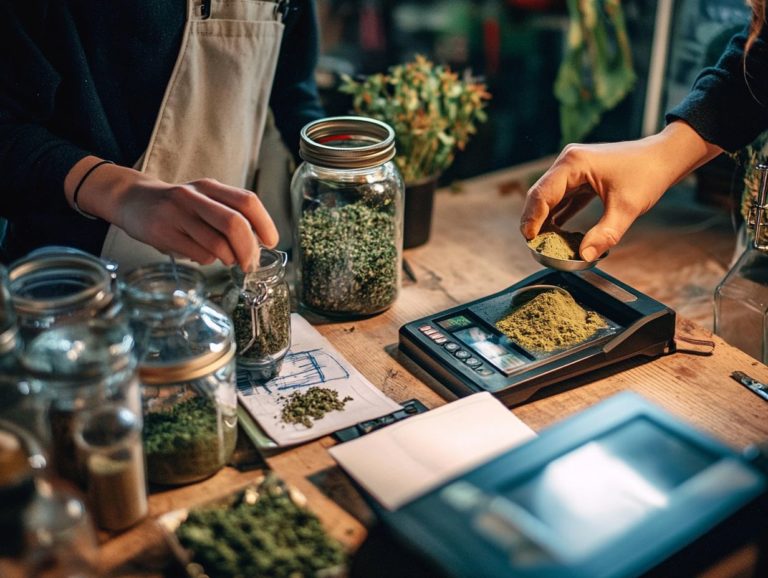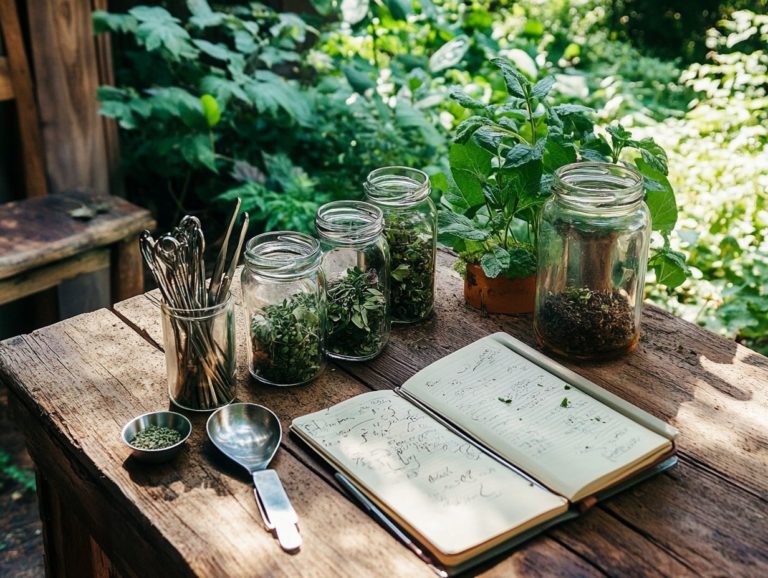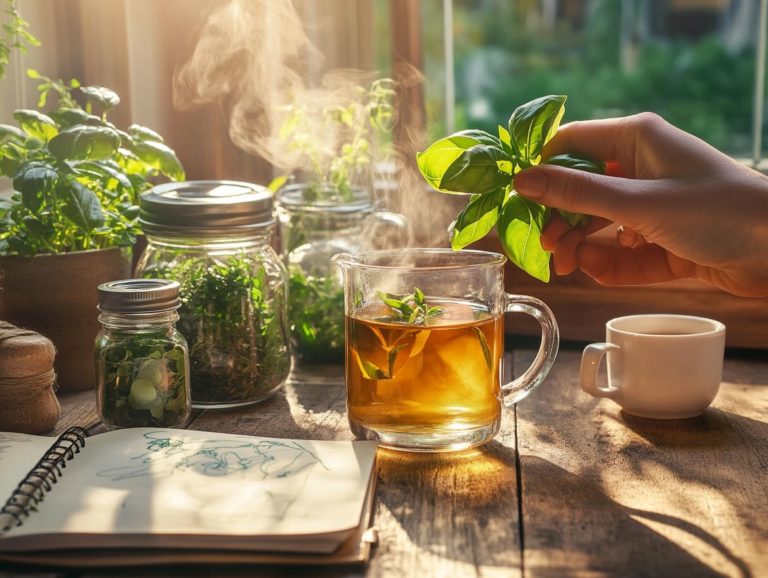Safety Testing for Herbal Remedies: What to Know
Herbal remedies have surged in popularity as natural alternatives for a variety of health concerns. However, this rise comes with an imperative need for rigorous safety testing and addressing potential risks associated with herbal supplements.
This article delves into what herbal remedies are, emphasizes the importance of safety testing, and outlines the various types of tests involved from lab assessments to clinical trials, ensuring compliance with FDA regulations. You’ll discover the regulations that govern these tests and gain insight into how to interpret the results effectively.
By the conclusion, you will be equipped with essential tips to ensure the safe use and purchase of herbal products, considering quality control and user precautions.
Contents
- Key Takeaways:
- Understanding Herbal Remedies
- The Importance of Safety Testing
- Types of Safety Testing for Herbal Remedies
- Regulations and Standards for Safety Testing
- Interpreting Safety Test Results
- Ensuring Safe Use of Herbal Remedies
- Frequently Asked Questions
- What is safety testing for herbal remedies?
- Why is safety testing important for herbal remedies, including various plant-based products?
- Who conducts safety testing for herbal remedies?
- What are the common safety tests used for herbal remedies?
- Is safety testing required for all herbal remedies?
- What should I know before using an herbal remedy?
Key Takeaways:

- Herbal remedies are traditional medicines made from plants and natural ingredients.
- Safety testing is crucial for herbal remedies to ensure their effectiveness and minimize potential risks.
- Lab testing and clinical trials are important methods of safety testing for herbal remedies, necessitating thorough quality assurance.
Understanding Herbal Remedies
Herbal remedies represent a rich tapestry of natural alternatives that have been cherished for centuries in traditional medicine. They aim at enhancing wellness and addressing a range of health conditions. These plant-based products, including herbal supplements, extracts, and botanical products, are sourced from medicinal plants and have garnered significant attention for their therapeutic benefits.
As you increasingly lean toward natural alternatives, grasping the efficacy, safety, and quality of these offerings, including common herbal supplements, becomes essential in your pursuit of optimal health outcomes.
What are Herbal Remedies?
Herbal remedies are natural products derived from plants, celebrated for their potential health benefits and therapeutic properties. They come in various forms, including soothing herbal teas, herbal tonics, concentrated extracts, and convenient capsules, each presenting its unique advantages.
For example, herbal teas like chamomile and peppermint not only provide a delightful sipping experience but also promote relaxation and support digestive health. Extracts such as echinacea and elderberry offer a more potent dose, making them ideal for bolstering your immune system. If you prefer simplicity, capsules are a fantastic way to seamlessly integrate herbal ingredients like garlic or ginseng into your routine without any fuss.
As many individuals seek natural alternatives for wellness, these herbal products have gained traction for their versatility and holistic benefits.
The Importance of Safety Testing
Safety testing is essential for herbal supplements and products. It ensures that they comply with FDA regulations and uphold consumer safety standards. This process protects you from risks like harmful contaminants and side effects.
As the demand for herbal remedies expands, establishing robust quality control measures becomes imperative. It helps validate both the effectiveness and safety of these products. By prioritizing thorough testing and adhering to safety protocols, you foster consumer trust and promote the responsible use of herbal ingredients.
Why Safety Testing is Necessary
Safety testing is essential for identifying potential risks associated with herbal supplements. It ensures your protection from harmful contaminants and adverse side effects.
Understanding the importance of detecting contaminants like heavy metals, pesticides, and microbiological agents is crucial for both manufacturers and consumers in ensuring product quality. When considering these herbal products alongside prescription or over-the-counter medications, recognizing potential drug interactions becomes vital. These combinations may lead to unexpected health complications and safety concerns.
It’s important for you to appreciate the significance of these evaluations. A safe herbal supplement can enhance your well-being, while an untested one may pose serious risks. Herbal safety testing protects your health and fosters trust in the entire industry, promoting a more informed approach to natural remedies.
Have you considered the safety of the herbal remedies you use? Start your journey to wellness with safe herbal choices today!
Types of Safety Testing for Herbal Remedies
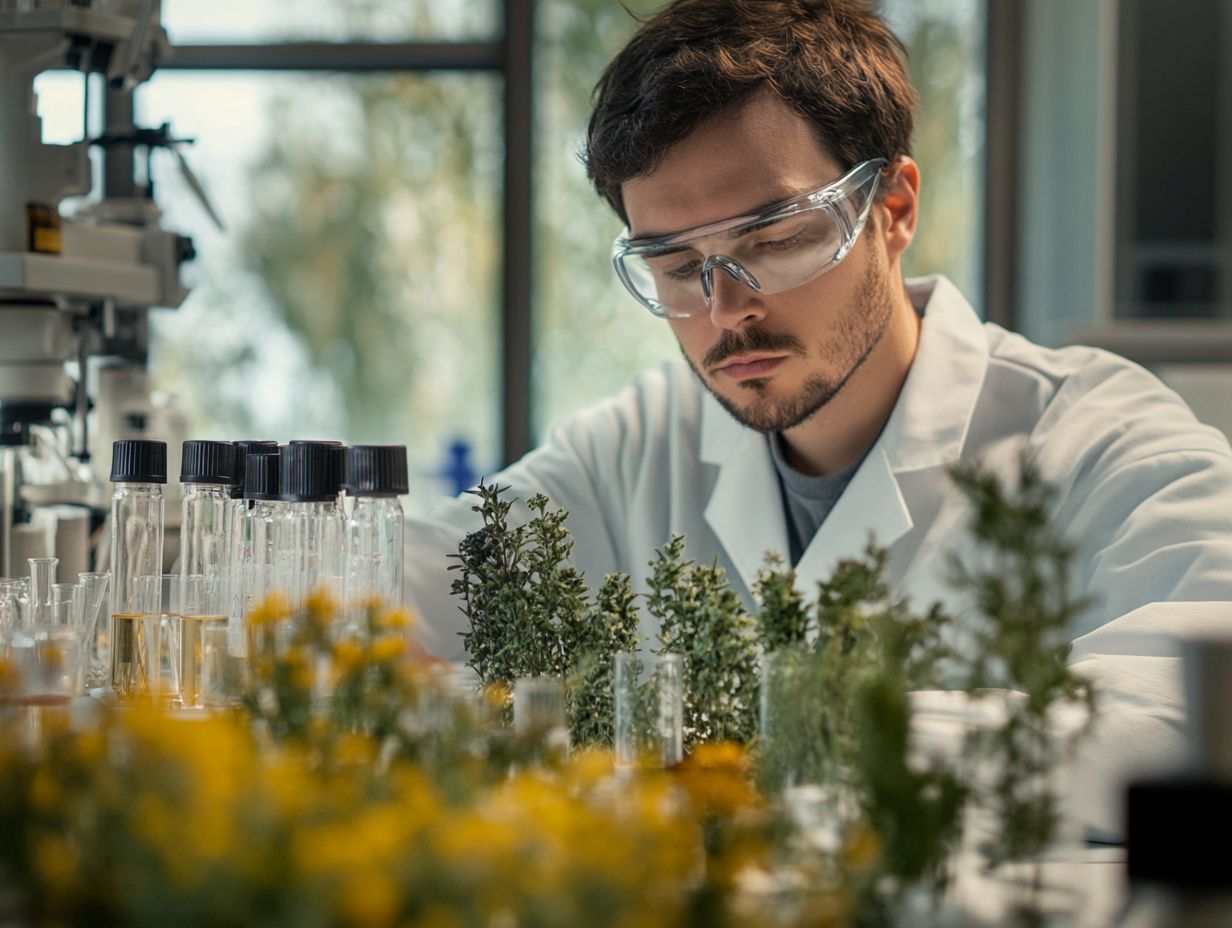
You ll find various types of safety testing for herbal remedies, such as in vitro testing, in vivo testing, and human clinical trials. Each method offers valuable insights into the safety and efficacy of herbal ingredients.
Understanding these testing methodologies is essential for evaluating the risks and therapeutic benefits of herbal products available in today s market.
In vitro Testing
In vitro testing means studying substances in a lab dish, outside of a living organism. This scientific approach validates the safety and potential therapeutic benefits of herbal remedies.
By using cell cultures and biochemical assays, researchers evaluate how these herbal ingredients work in the body and assess their toxicity. This understanding is crucial for determining efficacy and identifying possible side effects, as well as learning how to prevent herbal remedy contamination.
This thorough investigation ensures that herbal remedies meet necessary safety standards before they can be used by people, ultimately aiding in the development of reliable therapeutic options that are both safe and effective. To ensure responsible usage, it’s important to understand how to use herbal remedies responsibly.
In vivo Testing
In vivo testing refers to experiments conducted within a living organism. This testing allows researchers to evaluate the safety and efficacy of herbal remedies in real biological systems.
This type of testing is crucial because it helps uncover potential benefits and adverse effects that might not be evident through in vitro studies alone. By observing how herbal ingredients interact within a living organism, you can better determine dosages, interactions with other medications, and the overall therapeutic profile of these natural treatments. To ensure safety, it’s important to know how to evaluate if an herb is safe.
Such comprehensive safety testing is essential not only for regulatory approvals but also for ensuring consumer health. You deserve a clear picture of the risks and advantages associated with herbal therapies, and it’s important to know what you should know before using herbal remedies.
Human Clinical Trials
Human clinical trials are vital for assessing the safety and efficacy of herbal remedies. These trials provide valuable insights into their therapeutic benefits and potential side effects for human populations.
These trials serve as a crucial link between traditional practices and modern medicine, ensuring that herbal products are effective and free from harmful interactions or toxicity. By involving a diverse range of participants, researchers gain a clearer understanding of how factors like age, gender, and underlying health conditions may impact a product’s effectiveness and safety.
This thorough evaluation helps ensure that you can trust the herbal remedies you use! It also plays a significant role in building a strong body of evidence that supports regulatory approval and fosters consumer trust in herbal medicine, paving the way for its integration into integrative medicine. For more information, consider making herbal remedies that you can rely on.
Regulations and Standards for Safety Testing
Regulations and standards for safety testing of herbal supplements are overseen by various government agencies, including the FDA. These agencies establish comprehensive guidelines designed to ensure the quality, safety, and efficacy of products for consumers like you who seek herbal solutions.
By adhering to these regulations and safety protocols, you can feel more confident in the integrity of the herbal products you choose.
Government Agencies and Guidelines
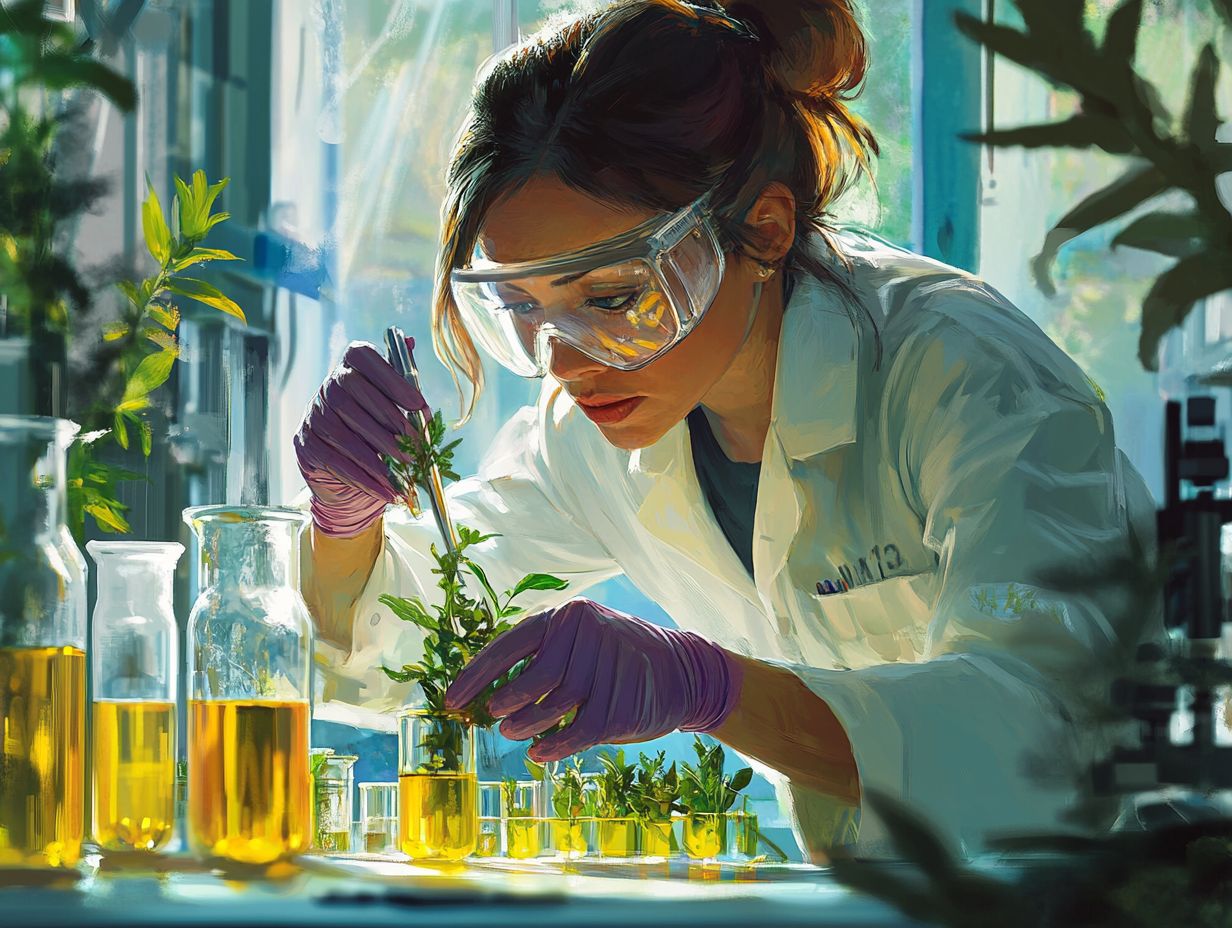
Various government agencies, including the Food and Drug Administration (FDA), provide essential guidelines for the safety testing of herbal products. These guidelines ensure that products meet established safety and quality standards.
In addition to the FDA, organizations like the FTC monitor advertising claims related to herbal remedies, effectively preventing misleading information that could endanger your health.
The USDA certifies organic herbal products, giving you peace of mind that what you’re purchasing is free from harmful pesticides and synthetic additives.
Together, these agencies create a framework that promotes responsible manufacturing practices while encouraging transparency within the industry. This multifaceted approach cultivates a safer market, empowering you to make informed choices about the herbal supplements you incorporate into your wellness routines.
Interpreting Safety Test Results
Interpreting safety test results is essential for you as a consumer. This understanding illuminates the potential risks and benefits tied to herbal remedies, fostering your trust in the efficacy of these products.
By grasping these results clearly, you empower yourself to make informed decisions when selecting herbal supplements for your health management needs.
What to Look for in Safety Test Results
When reviewing safety test results for herbal remedies, it’s vital to actively seek evidence of efficacy, safety concerns, potential risks, and any documented side effects associated with their use.
This means diving into the methods and research practices of the studies. Ensure they adhere to rigorous scientific standards, including FDA regulations, and evaluate whether the findings are backed by solid data, particularly from clinical trials.
Consider the population studied, including common herbal supplements and their effects, as results can differ based on factors such as age, genetics, and existing health and wellness practices.
Additionally, investigate potential interactions with pharmaceutical drugs, as these can significantly impact the overall safety profile. Being aware of regulatory approvals and certifications that assure product quality and consumer trust can provide valuable insights into the credibility of the testing process. For more guidance, refer to best practices for herbal remedy use. This ensures that the products you choose are both safe and effective for your needs.
Ensuring Safe Use of Herbal Remedies
Ensure the safe use of herbal remedies and dietary supplements. This includes following proper dosage instructions and claims made by herbal manufacturers, being aware of user precautions, and consulting a healthcare provider.
Engaging in ongoing patient education regarding medicinal plants and their uses can help reduce potential risks linked to these products.
By following safety protocols, you can guarantee the quality of herbal preparations and fully appreciate the therapeutic benefits of herbal supplements. This approach minimizes side effects and avoids any drug interactions, particularly with herbal tonics.
Stay informed about herbal supplements to make the best choices for your health!
Tips for Safe Consumption and Purchasing
To ensure the safe consumption of herbal remedies, you should adhere to purchasing guidelines that prioritize quality control measures for herbal products and user precautions, thereby minimizing potential risks.
- Start by researching brands and products before making a purchase check for third-party testing and quality checks that are important and certifications that affirm their quality.
- Seek suppliers who are transparent about their sourcing. This includes both their sourcing and manufacturing processes.
- Pay close attention to product labels, looking for clear details about ingredient origins, potential contaminants, potential allergens, and any safety warnings that should accompany herbal extracts.
By carefully examining these aspects, you can make informed decisions that safeguard your health and well-being, particularly in the context of herbal treatments when exploring herbal options.
Frequently Asked Questions
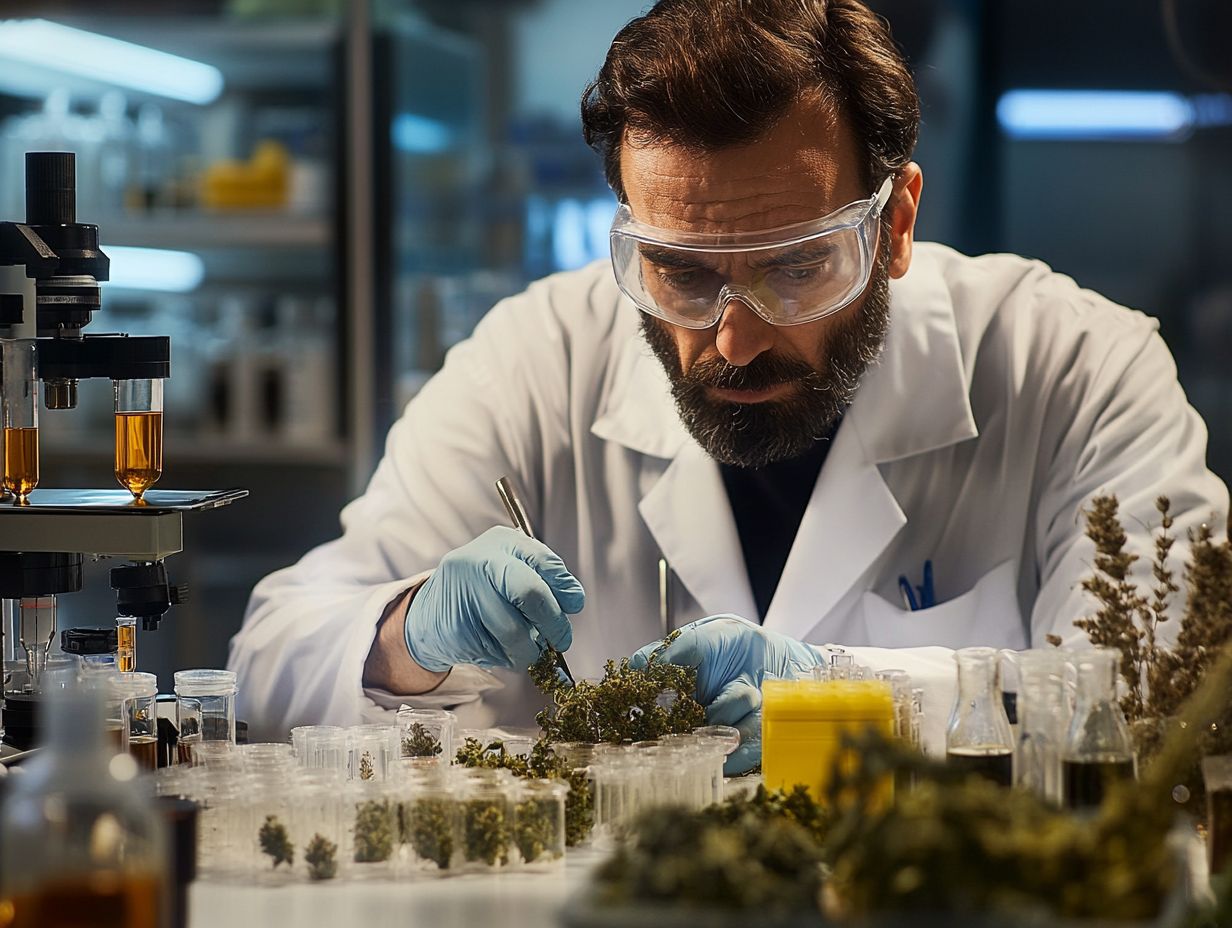
What is safety testing for herbal remedies?
Safety testing for herbal remedies refers to the process of evaluating the potential risks and side effects associated with using natural herbs for medicinal purposes. This involves conducting various tests and studies to determine the safety and efficacy of the herbal remedy.
Why is safety testing important for herbal remedies, including various plant-based products?
Safety testing is crucial for herbal remedies as it helps identify any potential risks or adverse effects associated with traditional medicine and herbal tonics. It ensures that the herbal remedy is safe for consumption and can provide the intended health benefits.
Who conducts safety testing for herbal remedies?
Safety testing for herbal remedies is typically conducted by trained professionals, such as pharmacists, herbalists, and scientists. They use various methods, including clinical trials and laboratory tests, to assess the safety and efficacy of the herbal remedy.
What are the common safety tests used for herbal remedies?
Some common safety tests used for herbal remedies include evaluating side effects and assessing the immune system, acute toxicity tests, chronic toxicity tests, mutagenicity tests (which check if a substance can cause genetic mutations), and carcinogenicity tests. These tests aim to determine the potential risks and side effects associated with using the herbal remedy.
Is safety testing required for all herbal remedies?
In most countries, safety testing is not mandatory for herbal remedies, but market regulations strongly recommend it. However, it is highly recommended to ensure the safety and quality of the product. It is always best to purchase herbal remedies from reputable sources that have undergone safety testing.
What should I know before using an herbal remedy?
Before using any herbal remedy, it is essential to do your research and consult with a healthcare professional, especially for herbal treatments. It is also crucial to follow the recommended dosage and instructions for use. If you experience any adverse effects, stop using the herbal remedy and seek medical advice.

